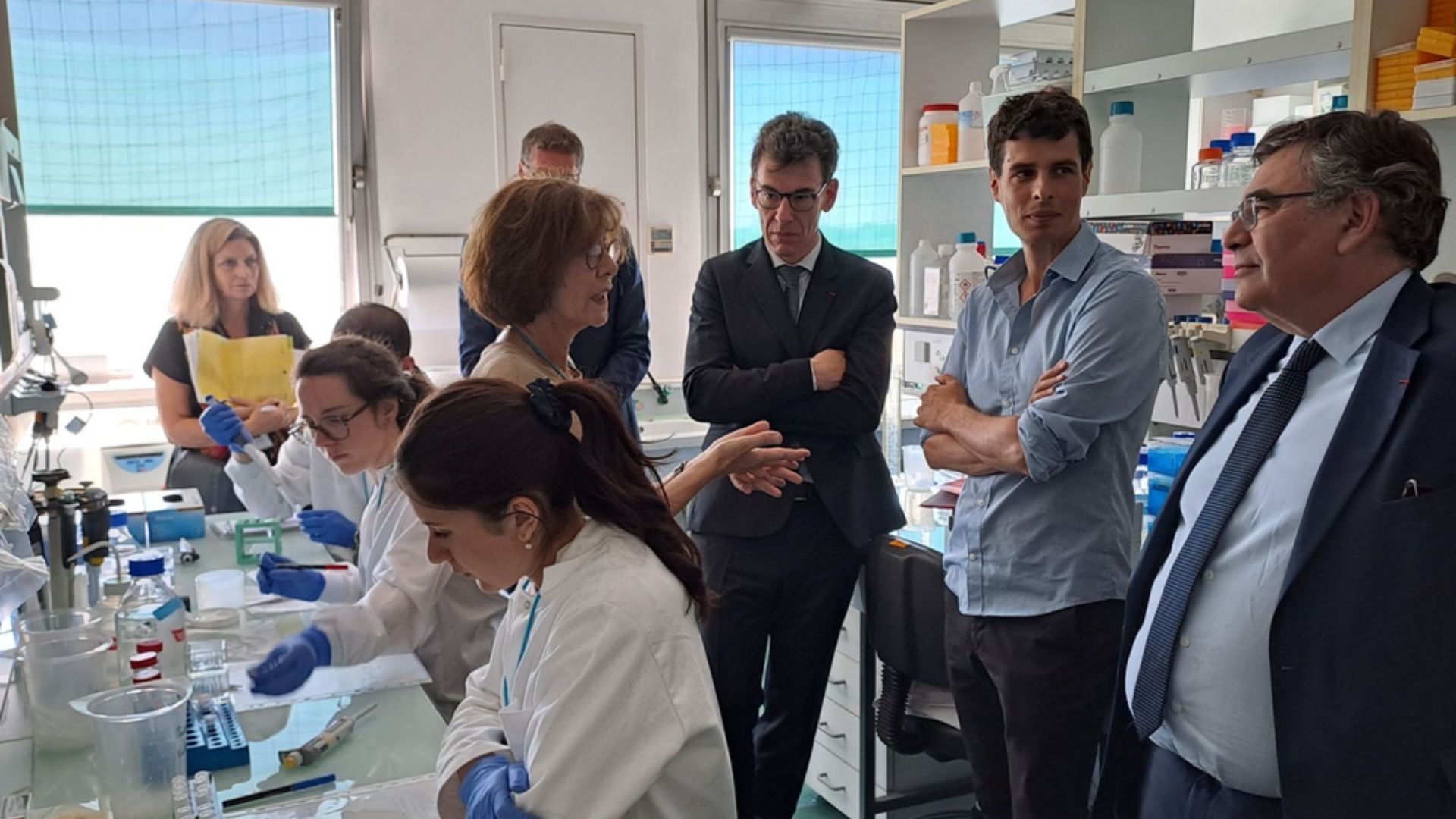Durée
87 heures
Faculté
Faculté de Santé
Langue des enseignements
Anglais
Présentation
Degree reference (à rappeler dans toute correspondance) : DUB941
Program directors: Prs Philippe Ravaud & Isabelle Boutron
Course face-to-face, taught in English
Objectifs
Objectives
At the end of this training, participants will be able to:
- Read and critically assess systematic reviews and complex meta-analyses;
- Design their own complex systematic review.
Compétences visées
Skills
Learners will be able to:
- Define meta-analyses of diagnostic and prognostic tests, and meta-analyses on individual data
- Understand their specificities compared to traditional systematic reviews
- Critically appraise these types of complex reviews
- Define what a network meta-analysis is
- Understand the specificities of network meta-analyses compared to traditional systematic reviews
- Critically appraise this type of complex review.
Programme
Degree reference : DUB941
Hours : 87 hours
Timetable: 17 November 2025- 15 January 2026 (Monday to Friday, all day), exams 21 January 2026
Course location : Reid Hall, Columbia Global Centers, 4 rue de Chevreuse, 75006 Paris
Educational materials are made available to students on Moodle
PROGRAM
Module 1: Methods in Systematic Reviews and Meta-Analysis I
- Systematic review of randomised trials, individual patient data meta-analysis. Methods of systematic reviews and meta-analysis: development of the protocol, search and selection of studies, data extraction and assessment of risk of bias.
- Meta-analysis: statistical analysis (combined estimation, heterogeneity evaluation, investigation of heterogeneity, bias in publication, use of software). Meta-analysis of personal data: pros and cons, statistical analysis
Module 2: Methods in Systematic Reviews and Meta-Analysis II
- Systematic review of observational studies, systematic review of diagnostic tests. Systematic reviews of observational studies: methodological issues, statistical analysis, methodological aspect of systematic reviews while evaluating a diagnostic test
Module 3: Network Meta-Analysis
- Methods of network meta-analysis: indirect comparison, statistical analysis, publication bias
MOYENS PÉDAGOGIQUES ET TECHNIQUES D’ENCADREMENT
Course team
- Isabelle Boutron, AP-HP, Centre d’épidémiologie clinique de l’Hôtel-Dieu, Cochrane France, Université Paris Cité
- Sally Hopewell, University of Oxford
- Lina El Chall, Université de Strasbourg
- Mariska Leeflang, University of Amsterdam
- Anna Chaimani, AP-HP, Centre d’épidémiologie clinique de l’Hôtel-Dieu, Cochrane France
- Dimitris Mavridis, University of Ioannina
Ressources matérielles
Afin de favoriser une démarche interactive et collaborative, différents outils informatiques seront proposés pour permettre :
- d'échanger des fichiers, des données
- de partager des ressources, des informations
- de communiquer simplement en dehors de la salle de cours et des temps dédiés à la formation.
MOYENS PERMETTANT DE SUIVRE L’EXÉCUTION DE LA FORMATION ET D’EN APPRÉCIER LES RÉSULTATS
Au cours de la formation, le stagiaire émarge une feuille de présence par demi-journée de formation en présentiel et le Responsable de la Formation émet une attestation d’assiduité pour la formation en distanciel.
À l’issue de la formation, le stagiaire remplit un questionnaire de satisfaction en ligne, à chaud. Celui-ci est analysé et le bilan est remonté au conseil pédagogique de la formation.
Contrôle des connaissances
A one-hour long oral examination, graded out of 20
Aménagements particuliers
Admission
Public cible
- Health researchers
- Health professionals
- Candidates deemed able by the director of teaching and authorised by the educational council to follow the course
Conditions d'admission
Apply on C@nditOnLine See below for more information.
How to apply:
Degree reference: DUB941
For a more detailed guide, ask your coordinator (see in « contacts »)
- Create your account on C@nditOnLine
- Activate your account. For that, go on the email account you put, click on “activer mon compte” and enter the code that is in the email. Then, log in.
- Choose “formation diplomante”. On the following page carefully fill in your personal information and professional information.
- Add the following supporting documents, in PDF format only:
- Both sides of an identity card or a passport
- Non Europeans: you will also need your visa / residence permit
- The degree you have to access this training
- Any supporting document for the discounted prices, see below in “training fees”
- Check your information again and confirm (“valider”)
- Click on “nouvelle candidature” (= new application) on the right.
- In order, select this information: “UFR de Médecine UP”, “Diplôme Universitaire ou Inter-Universitaire (DU/DIU) ou DAEL", "DUB941 – DU methodes avancees revues systematiques". For the third one, the name may change, check that the reference (DUB941) is correct.
- Select how the DU will be paid and fill in any information needed.
- Upload, in PDF format only, those documents:
- A resume / CV
- A personal statement addressing your interest in this programme
- Any extra document you think would be useful.
- If your employer or a third body is paying for this degree, add a document proving this, with their name and contact information.
WE CANNOT PROCESS INCOMPLETE APPLICATIONS.
Pré-requis
A good knowledge of English is necessary, B2/C1. (Knowledge of French is not needed.)
Les clefs de la réussite
Des fiches pratiques sont à votre disposition sur la page http://www.reussir-en-universite.fr/index.html.
Modalités de candidature
Degree reference: DUB941
Apply on C@nditOnLine See below for more information.
How to apply:
For a more detailed guide, ask your coordinator (see in « contacts »)
- Create your account on C@nditOnLine
- Activate your account. For that, go on the email account you put, click on “activer mon compte” and enter the code that is in the email. Then, log in.
- Choose “formation diplomante”. On the following page carefully fill in your personal information and professional information.
- Add the following supporting documents, in PDF format only:
- Both sides of an identity card or a passport
- Non Europeans: you will also need your visa / residence permit
- The degree you have to access this training
- (Any supporting document for the discounted prices, see below in “training fees”)
- Check your information again and confirm (“valider”)
- Click on “nouvelle candidature” (= new application) on the right.
- In order, select this information: “UFR de Médecine UP”, “Diplôme Universitaire ou Inter-Universitaire (DU/DIU) ou DAEL", "DUB941 – DU methodes avancees revues systematiques". For the third one, the name may change, check that the reference (DUB941) is correct.
- Select how the DU will be paid and fill in any information needed.
- Upload, in PDF format only, those documents:
- A resume / CV
- A personal statement addressing your interest in this programme
- Any extra document you think would be useful.
- If your employer or a third body is paying for this degree, add a document proving this, with their name and contact information.
WE CANNOT PROCESS INCOMPLETE APPLICATIONS.
Droits de scolarité
Training fees
Admission fees: 300€ (unless you are already registered at l'Université Paris Cité OR at l’IPGP for the academic year, in that case, add your certificat de scolarité in your C@nditOnline file)
+
Tuition fees, depending on your profile:
- Regular price: 1610€
- Discount price*: 1290€
- Student/Intern: 1070€
* You can benefit from the discount if you are a graduate of less than 2 years from a DN / DE / DIU; OR if you can provide proof of AHU or CCA or FFI hospital status for the current year.
If you do not pay the regular price and/or if a third body is paying partly or fully for this training, remember to add supporting documents to your file.
The rates for training fees and application fees are subject to change by the University Board of Directors.
Et après ?
Poursuites d'études
And after?
You can always supplement or learn new skills by enrolling in other college degrees or seminars.
You can go even further and apply for our Master's of Public Health in CER (Comparative
Effectiveness Research).
Contacts
Philippe Ravaud
Responsable(s) pédagogique(s)
Dernière mise à jour le 13 juin 2025
A lire aussi
Vous trouverez sur les sites internet des Facultés – Santé, Sciences, Sociétés & Humanités – et de l’Institut de physique du globe de Paris, les informations relatives à la rentrée 2025-2026 dans vos formations et les services dont vous pouvez bénéficier.
Organisé dans le cadre d’un partenariat entre Sciences Po et l’Université Paris Cité, le premier concours d’affiches sur l’intégrité académique a récompensé trois créations étudiantes pour leur originalité, leur force de message et leur pertinence pédagogique. À la rentrée 2025‑2026, l’affiche lauréate du premier prix sera diffusée sur les sites et campus d’UPCité.
Lors de sa visite à l’Institut Cochin, Philippe Baptiste, ministre chargé de l’Enseignement supérieur et de la Recherche, a réaffirmé l’importance stratégique de l’accueil des étudiantes et étudiants internationaux pour la France. Une orientation que partage pleinement l’Université Paris Cité, engagée en faveur d’une expérience étudiante inclusive, durable et ambitieuse.






